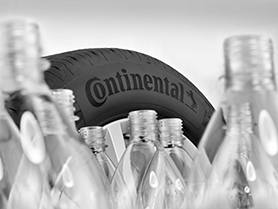
Continental is prioritising the use of renewable and recycled materials in its tyre production. While the share of these materials averaged 26% in 2024, the tyre manufacturer expects an increase of 2 to 3 percentage points by the end of this year. In just five years, by 2030, this figure is expected to rise to at least 40%. Among other materials, the focus is on rubber and resins from various more sustainable sources.

Both materials are essential for the quality and performance characteristics of tyres. Synthetic rubber from renewable and recycled materials and responsibly sourced natural rubber play a crucial role in more sustainable tyre production. This is due not least to the high content of this key raw material in every tyre produced, with modern high-performance tyres consisting of up to 40% rubber by weight.
The actual type of rubber used in a particular tyre depends heavily on the component in question and the function it performs. Continental car tyres are composed of up to 100 different raw materials, which in turn are used to produce up to 20 different customised rubber compounds per article. These also contain more and more recycled variants of additives and supplementary raw materials, as well as circular resins that make the resulting rubber more pliable and improve overall tyre performance.
“We’re closing the loop. Continental is ramping up its commitment to a circular economy and mapping out its path for the future,” says Jorge Almeida, head of sustainability at Continental Tyres. “Innovative solutions enable us to use more sustainable raw materials such as synthetic rubber made from used cooking oil, or resins based on certified renewable feedstocks originally derived from vegetable oil.”
Rubber is a vital commodity for global mobility. Vehicles such as cars, trucks, bicycles and e-bikes all rely on rubber tyres to keep them moving, as do motorbikes, forklift trucks and port cranes. The components that make up a tyre consist of various types of rubber spanning a range of applications. Continental mainly uses two categories of rubber, each offering specific technological benefits for specific tyre components: natural rubber and synthetically produced rubber.
Natural rubber – the type traditionally used in tyre production – is used, for example, in the treads of car and truck tyres, where the rubber needs to be extremely hard-wearing. Its special properties include its impact resistance and durability, thanks to the strain-induced crystallisation inherent in naturally grown rubber. This unique feature of natural rubber cannot yet be reproduced artificially.
Synthetic rubber, meanwhile, is incorporated into the tread of car tyres in addition to natural rubber because of its superior braking performance and rolling resistance. The tyre manufacturer is increasingly using synthetic rubber derived from more sustainable sources, such as pyrolysis oil made from end-of-life tyres or used cooking oil. It sources the raw materials for this more sustainable synthetic rubber from suppliers such as Synthos and TotalEnergies Cray Valley, both of which are using a mass balance approach valorising sustainable sources certified by the ISCC PLUS International Sustainability and Carbon Certification.
The production processes and raw materials used to manufacture the synthetic rubber supplied comply with this system.
Circular resins for more sustainable use of materials in tyre production
Continental takes a holistic approach to its tyre development. This includes ensuring that all raw materials are sourced from more sustainable sources step by step. For example, there are special resins for almost every rubber compound that enable a perfect balance between the elasticity and resilience of the tyre.
Resins play a crucial role in unlocking rubber compounds’ optimum performance, for example, by improving their wet grip, abrasion resistance and rolling resistance, which in turn reduces the vehicle’s energy consumption. Continental already uses circular resins produced by suppliers like TotalEnergies Cray Valley that are ISCC PLUS-certified, sustaining along the value chain the development of renewables feedstocks originally coming from vegetable oil or used cooking oil.
Use of more sustainable additives
Alongside resins, certain additives also constitute an indispensable part of the tyre production process at Continental. These are used, for example, to protect rubber during vulcanisation against the side-effects of heat or oxygen. Continental is the first tyre manufacturer using the ISCC PLUS certified rubber additive TMQ from LANXESS, while adhering to the same high quality and performance specifications. According to life cycle assessments, this additive, which is produced from raw materials such as biocircular acetone, has a carbon footprint that is more than 30% lower than its conventionally manufactured counterpart. Biocircular acetone is made from waste of biological origin, like recycled cooking oil.
Traceability of mass balance-certified materials
The use of such sustainable materials is made possible, among other things, by the mass balance approach, which Continental systematically uses to advance its goal of using at least 40% renewable and recycled raw materials in tyre production. The approach involves mixing fossil, renewable and recycled materials during the manufacturing process and tracking them as they move along the value chain. This allows the company to attribute the input of renewable and recycled raw materials to the output of the final product and thus precisely document, and successively increase, the use of ISCC PLUS certified materials.
“The mass balance approach enables us to manage the complexity of the raw materials portfolio efficiently and track how these raw materials are used at multiple production sites in a wide range of markets,” explains Matthias Haufe, head of material development and industrialisation at Continental Tyres. “In this way, we can steadily increase the share of renewable and recycled materials in our tyre production, and transparently document the progress we make.”
For more information contact Jiminy Bosman, Continental Tyre SA,

© Technews Publishing (Pty) Ltd | All Rights Reserved